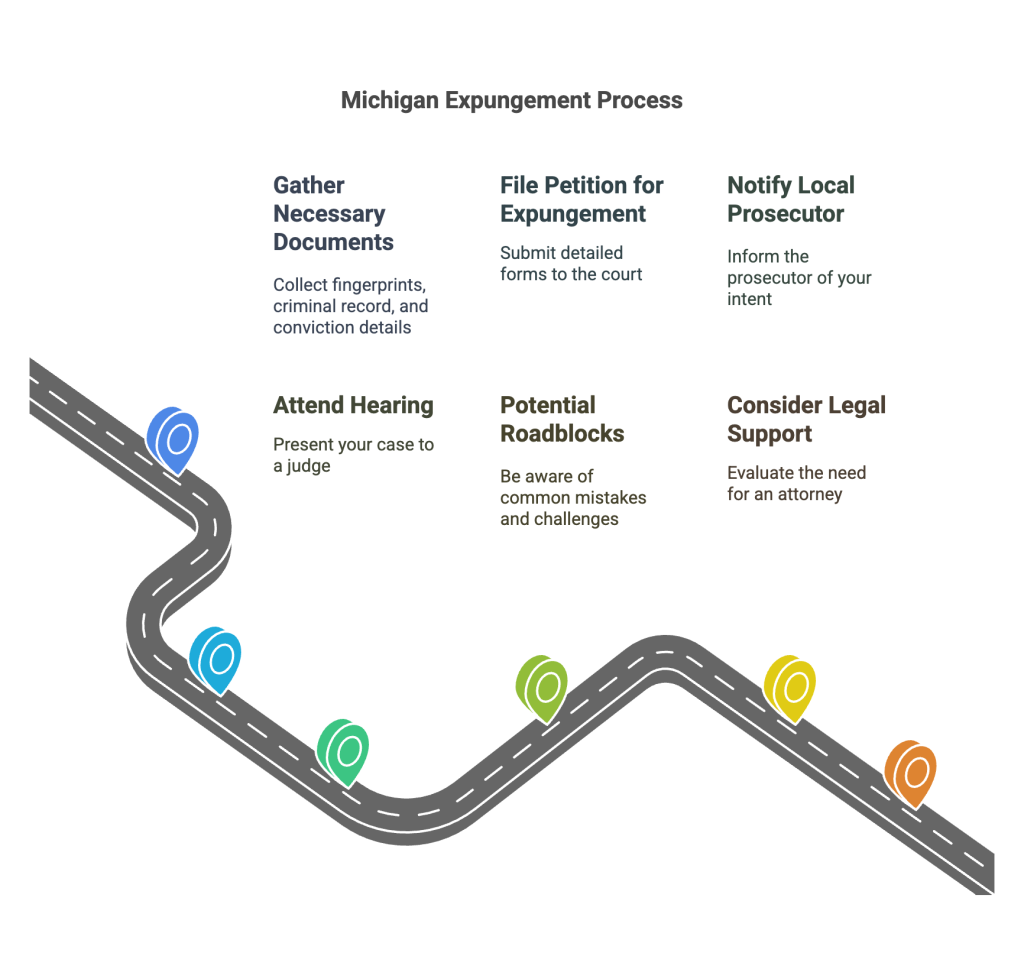Clearing your record can be a game-changer in employment opportunities and personal peace of mind. Whether you've faced obstacles like bias or job application rejections, understanding the process of expungement is crucial. If you reside in Michigan and wish to expunge your record, this guide will walk you through the entire process, explain the eligibility criteria, and highlight how it relates to employment. Armed with this knowledge, you can step confidently into the next chapter of your life.
Key Takeaways
- Expungement removes criminal records from public access, benefiting job searches by removing potential hiring obstacles.
- Michigan's expungement process distinguishes between record sealing and expungement, with specific eligibility criteria outlined in the Clean Slate Act.
- Eligibility depends on the conviction type and time since sentence discharge, with some laws allowing automatic expungement after a set period.
- The expungement process involves collecting documents, filing a petition, notifying the prosecutor, and attending a court hearing, where legal assistance can be helpful.
- Successful expungement enhances employment opportunities by keeping records from appearing in background checks, allowing you to focus on skills and future contributions.
Introduction
Expungement is the legal process of erasing or sealing criminal records from the public domain. In the realm of employment, having a record expunged can be tremendously beneficial. It can remove barriers that a criminal record may create during job searches. Employers often conduct background checks before hiring, making expungement vital for anyone who wants to expand their job opportunities.
People with criminal records often face significant challenges. These can include bias from potential employers and outright job application rejections. Records don't just tell one story; they can serve as a heavy anchor in the job market. Expungement can lighten that load, allowing individuals to begin with a clean slate and more equal footing in the hiring process.
This guide will provide you with the knowledge needed to navigate Michigan's unique expungement process. You will learn about the eligibility criteria and the steps involved, all while exploring how this links directly to employment rights in Michigan. Understanding these aspects can empower you to move past obstacles and seize new opportunities.
Understanding Expungement in Michigan
Expungement refers to the process by which a criminal conviction is erased from your record, making it invisible or inaccessible to most employers and the public. In Michigan, the term "expungement" is typically used interchangeably with "record sealing," but they have distinct legal implications. Expungement completely removes the conviction, whereas record sealing typically limits access to the record but does not erase it.
In Michigan, the legal framework for expungement is governed by several statutes under the Michigan Compiled Laws (MCL). These laws outline who is eligible, which offenses can be expunged, and the specific procedures that must be followed. One pivotal statute is the Clean Slate Act, which expanded eligibility and streamlined the process to make it more accessible to individuals seeking a fresh start.
Before seeking expungement, it's essential to understand these legal nuances. For example, certain serious offenses, such as violent crimes or offenses punishable by life imprisonment, are generally ineligible for expungement. Also, there's often a waiting periodâranging from three to five years, depending on the nature of the convictionâbefore you can file for expungement. This period allows the court to consider any subsequent offenses or behavior that may influence the decision.
As of recent updates, the law now allows for automatic expungement of certain offenses after a set period, provided no new crimes have been committed. These changes aim to reduce barriers and assist in rehabilitation by alleviating the long-lasting impacts of a criminal record. Understanding these legal elements is the first step in reclaiming your narrative and improving future employment prospects.
Expungement Eligibility in Michigan
To be eligible for expungement in Michigan, you need to meet certain criteria. Generally, you can apply to have your record expunged if you've remained conviction-free for a specific period following the discharge of your sentence. This waiting period varies depending on the type and number of convictions.
For most misdemeanors, the wait time is three years. Felony convictions often require a five-year wait. However, some serious offenses, like felonies involving life imprisonment, cannot be expunged. Michigan allows up to three felony convictions to be expunged, but only if none are the most serious offenses. You can also seek expungement for multiple misdemeanors, provided you have no more than two.
Michigan has recently updated its laws to be more inclusive. Known as the "Clean Slate" laws, they allow automatic expungement for certain offenses after a set period for individuals without new convictions. This legislation aims to simplify the process, reducing the barriers many face in clearing their records.
Check if your offense qualifies and keep track of changes in the law. Staying informed improves your chances of successfully expunging your record. Are you ready to see if you qualify? Reach out to a legal expert or consult online resources for guidance tailored to your situation.
The Expungement Process
Embarking on the expungement process in Michigan involves several clear-cut steps. You start by gathering the necessary documents, which include fingerprints, an up-to-date criminal record, and the details of the convictions you're aiming to expunge. It's crucial to ensure that every document accurately reflects your legal history, as incomplete or incorrect submissions can derail your application.
Next, you'll need to complete and file a petition for expungement with the court where your conviction occurred. This includes detailed forms that require precise information about each conviction, such as dates and case numbers. Pay careful attention to submission deadlines and requirements, as failure to adhere can lead to delays or denial.
After you've filed your petition, the court will schedule a hearing. It's your responsibility to notify the local prosecutor of your intent to have your record expunged. This notification process is not to be overlooked, as the prosecutor has the right to contest your petition.
At the hearing, you'll present your case to a judge. This is where having an attorney can be beneficial. While not mandatory, a lawyer familiar with Michigan's expungement laws can help articulate your position more effectively. They can advise you on potential questions the judge might ask and prepare responses that strengthen your case.

Potential roadblocks
Even with solid preparation, be aware of potential pitfalls. Missing deadlines, submitting incorrect information, or failing to adequately prepare for your hearing are common mistakes. Each can significantly impact the success of your petition. And remember, even a denied petition isn't the end. Understanding why it was denied can help form a stronger application in the future.
Engaging an attorney adds a layer of expertise to your process but consider the cost implications carefully. Weigh the complexity of your case against your budget to decide whether professional legal support is beneficial in your circumstance.
The Impact of Expungement on Employment Opportunities
Expungement can open doors to opportunities previously blocked by a criminal record. In Michigan, clearing your record could significantly tilt the odds in your favor when job hunting. Employers often perform background checks as part of the hiring process. If your record is expunged, it won't appear in those checks, meaning past convictions won't haunt your future prospects.
While expunged records become inaccessible to most employers, not all traces vanish. Law enforcement and certain government agencies may still view them. But for the majority of private sector jobs, your expunged record becomes invisible. This clean slate allows you to compete more fairly and focus on showcasing your skills.
Background checks have become a standard part of the hiring process. The Federal Trade Commission (FTC) outlines what employers can and cannot do with this information. After expungement, your record should not appear in these checks, offering you a fresh start. It's worth familiarizing yourself with these guidelines to know your rights.
A clear record can lead to increased confidence in job interviews. When discussing your background with potential employers, honesty remains crucial. If asked about criminal history, knowing whether expunged information can legally be discussed or remains private is vital.
Your journey to expungement can transform how youâre perceived in the job market. Understanding these dynamics empowers you to leverage your qualifications without the shadow of a past conviction. Are you ready to take control of your career path?
Real-Life Impacts of Expungement
Expungement isn't just a legal formalityâit's a tool for transformation. Let's dive into a couple of case studies to understand its real-life impact.
Consider John. Ten years ago, he made a poor decision that resulted in a non-violent drug conviction. This record haunted him for years, limiting his employment options. Once eligible, John pursued expungement in Michigan. The clean slate it provided was pivotal; he secured a managerial position at a logistics company that wouldnât consider him previously.
Now, let's talk about Sara. She had a misdemeanor for shoplifting on her record. It followed her into every job interview, often ending her chances before they began. After expungement, she finally landed a role in retail management, where her past experience, ironically, gave her insights that improved theft prevention strategies.
These stories illustrate more than personal victoriesâthey highlight opportunities for employers too. Hiring individuals who have undergone expungement can bring motivated, loyal employees eager to make the most of their second chance. Businesses benefit from a broader talent pool, often gaining dedicated workers with unique perspectives.
The question to ponder is: How can more employers be encouraged to consider candidates with expunged records? As you think about this, remember that expungement is not just a legal reset; it opens doors to potential for everyone involvedâindividuals and businesses alike.
Additional Resources
If you're seeking assistance with the expungement process in Michigan, several organizations and services can help you navigate the journey.
Legal Aid and Clinics: Many community legal aid societies offer free or low-cost services to those in need. The State Bar of Michigan's website is a valuable starting point to find appropriate resources. Look for local clinics that specialize in record expungement to get advice tailored to your situation.
Support Groups and Counseling: Going through an expungement process can be emotionally taxing. It's beneficial to connect with support networks that focus on empowerment and advocacy for individuals with criminal records. Organizations like Michigan Works! offer employment support, often pairing that with advice and counseling services.
Further Reading: For more detailed strategies and insights, check out blogs and articles from experts in the field. GCheck's blog, for example, covers a range of topics about maintaining clear records and improving job prospects. Engaging with well-researched content can provide you the confidence needed to tackle the expungement process fully informed.
Conclusion
Clearing your record through expungement isn't just a legal procedure; it sets a foundation for new beginnings. With your record expunged, many doors open wider. You're not only altering your paperwork, but also your opportunities. Employers often focus on your potential contributions rather than past missteps.
Consider the possibilities: applying for jobs without fearing a background check, discussing your history without worry, and building a career on your own terms. Seize this chance to redefine your professional path.
Start now rather than later. Gather your documents, reach out for assistance if needed, and begin this journey. By taking action, you're investing in a future where your past no longer dictates your destiny. The steps today lead to opportunities tomorrow. It's your time to move forward.
Frequently Asked Questions (FAQs)
How much does expungement cost in Michigan?
The cost of expungement in Michigan typically includes court fees, which can range from $50 to $100. Additional costs may include attorney fees if you hire legal assistance.
Can employers see expunged records in MI?
No, employers generally cannot see expunged records. Once a record is expunged, it is sealed from public view, including background checks conducted by employers.
Are marijuana convictions expunged automatically in MI?
Some marijuana offenses may qualify for automatic expungement under recent laws. However, this does not apply to all cases, so it's advisable to check your specific situation.
How long does expungement take in Michigan?
The expungement process can take several months. This varies depending on the complexity of your case and the courtâs schedule.
What crimes canât be expunged in MI?
Certain offenses, such as felonies punishable by life imprisonment, traffic offenses, and violent crimes, cannot be expunged in Michigan.
Do employers have to ignore sealed records in Michigan?
Yes, once a record is expunged and sealed, employers should not consider it during the hiring process.
Can expunged records affect professional licenses in MI?
In most cases, expunged records should not affect professional licenses. However, it's recommended to consult with a legal expert in your field.
How to check if your MI record is expunged?
You can check your record status by contacting the court where your expungement was filed or using the Michigan State Police's ICHAT system.
Can you expunge a violent felony in Michigan?
Violent felonies generally cannot be expunged. Check with a legal professional for specific guidance on your case.
Does expungement restore gun rights in MI?
Expungement can restore gun rights for certain offenses. You should consult with a legal expert to understand how this applies to your case.
Can traffic offenses be expunged in Michigan?
No, traffic offenses, including DUI convictions, generally cannot be expunged in Michigan.
Are juvenile records automatically expunged in Michigan?
Juvenile records are not automatically expunged. You must apply for expungement once eligible.
What is the eligibility criteria for expungement in Michigan?
You must meet specific criteria, such as waiting a set period after sentencing or release. Eligibility varies by the offense, so review the guidelines or consult with a lawyer.
Do I need an attorney to apply for expungement in Michigan?
It's not required, but having an attorney can help navigate the legal process and increase your chances of a successful expungement.
Definitions
Background Check
A background check is an investigation employers often use to verify information about job applicants. This can include criminal records, employment history, education, and references. If your record is expunged, most private employers will not see past convictions in these checks. Knowing what will and wonât appear can help you prepare for interviews and applications.
Hiring Process
The hiring process refers to the steps an employer takes to fill a job. This includes job postings, interviews, offers, and background screening. Expungement can impact this process by increasing your chances of moving past the screening stage. A clear record may allow your qualifications to carry more weight in decisions.
Eligibility
Eligibility is the set of conditions you must meet to apply for expungement. In Michigan, this varies based on the type and number of convictions, along with how much time has passed. For example, you may need to wait three to five years after your sentence ends. Review state rules carefully to see if you qualify.
Record Sealing
Record sealing is similar to expungement, but with important legal differences. Sealed records are hidden from most employers and the public but still exist. Law enforcement and certain agencies can still access them. Knowing whether your case qualifies for expungement or sealing helps you understand your rights.
Employment Opportunity
Employment opportunity refers to the chance to get hired or advance in your career. A criminal record can limit these chances, especially during background checks. Expungement may level the playing field by removing those barriers. It allows others to see your skills and experience without your past affecting their view.

GCheck Editorial Team
Meet the GCheck Editorial Team, your trusted source for insightful and up-to-date information in the world of employment background checks. Committed to delivering the latest trends, best practices, and industry insights, our team is dedicated to keeping you informed.
With a passion for ensuring accuracy, compliance, and efficiency in background screening, we are your go-to experts in the field. Stay tuned for our comprehensive articles, guides, and analysis, designed to empower businesses and individuals with the knowledge they need to make informed decisions.
At GCheck, we're here to guide you through the complexities of background checks, every step of the way.






